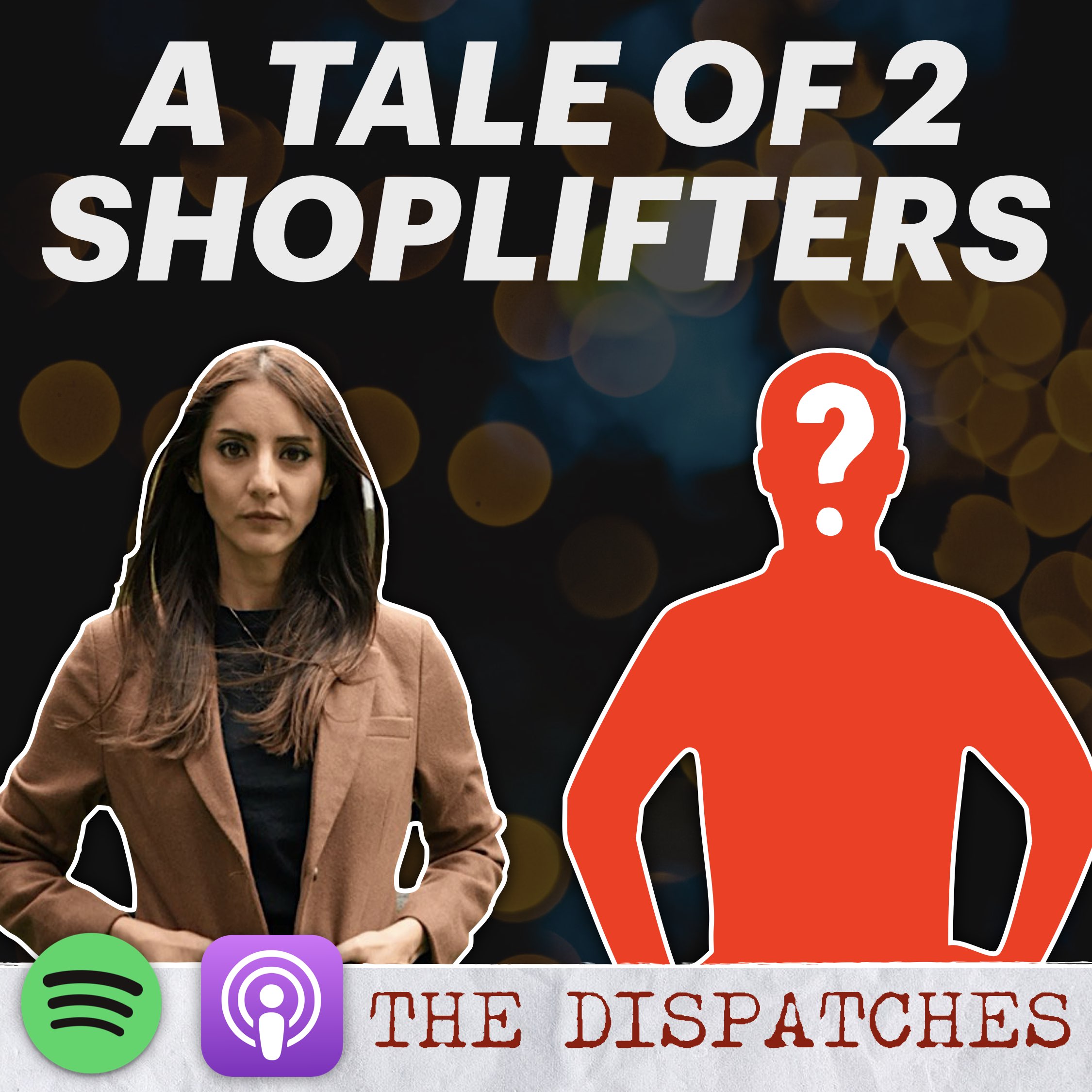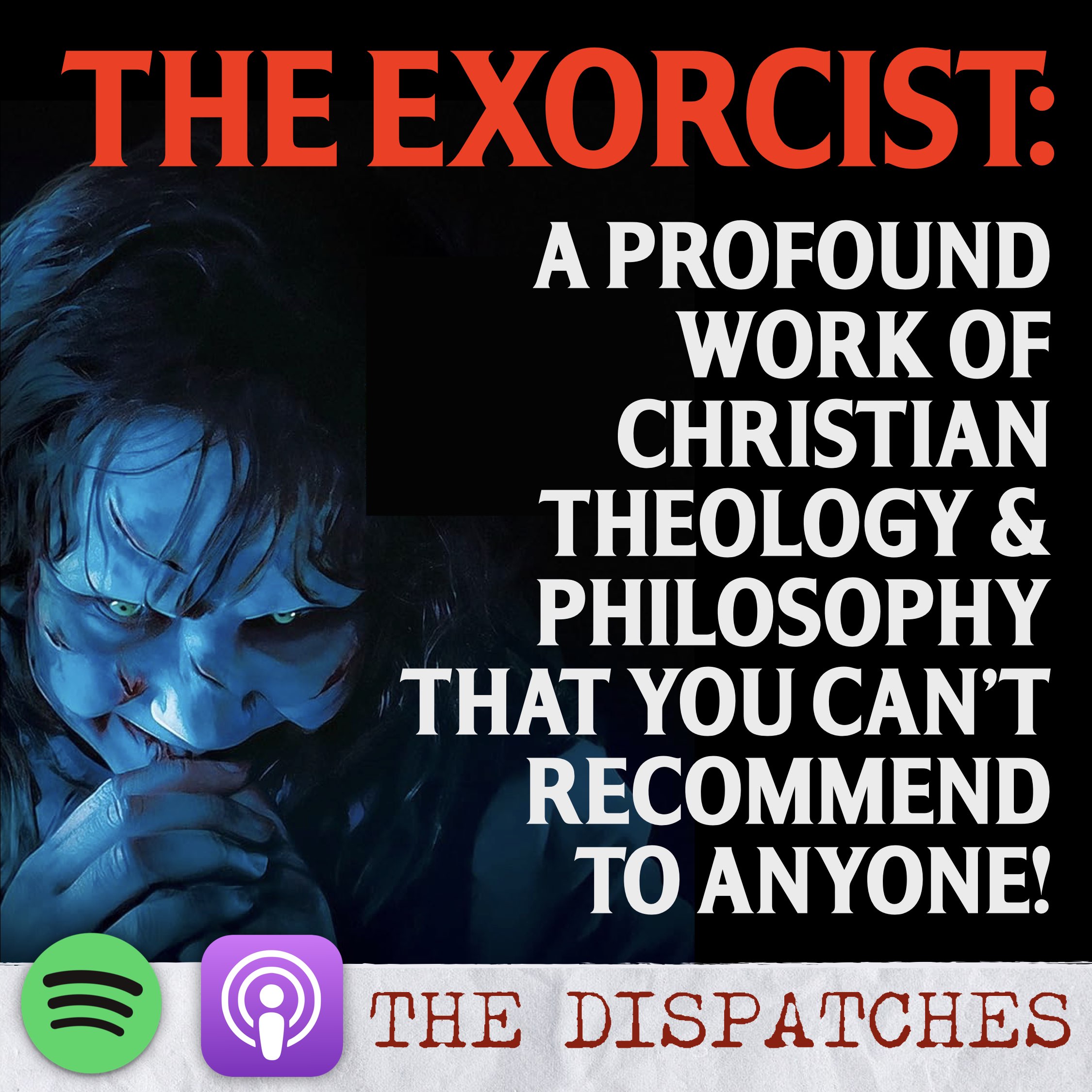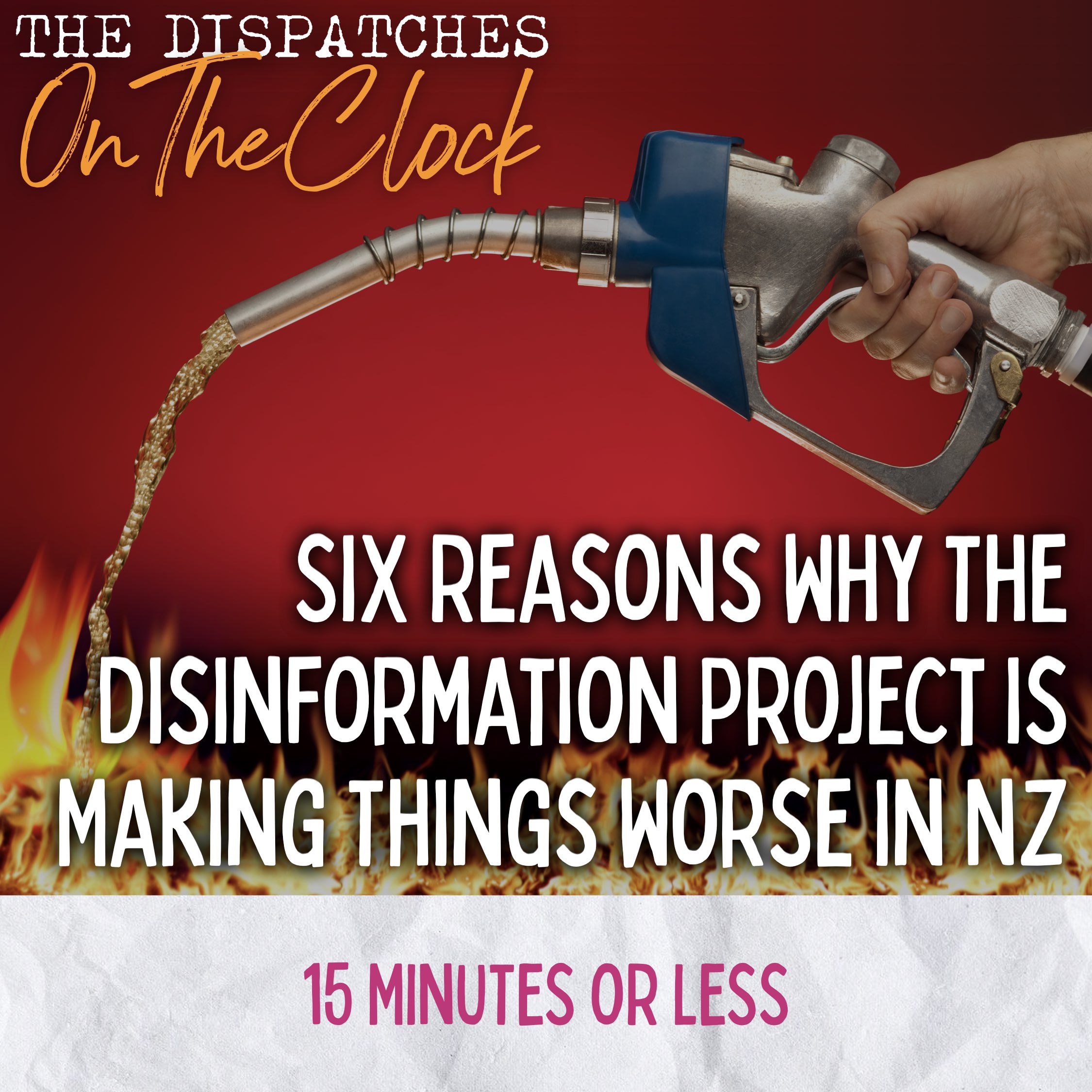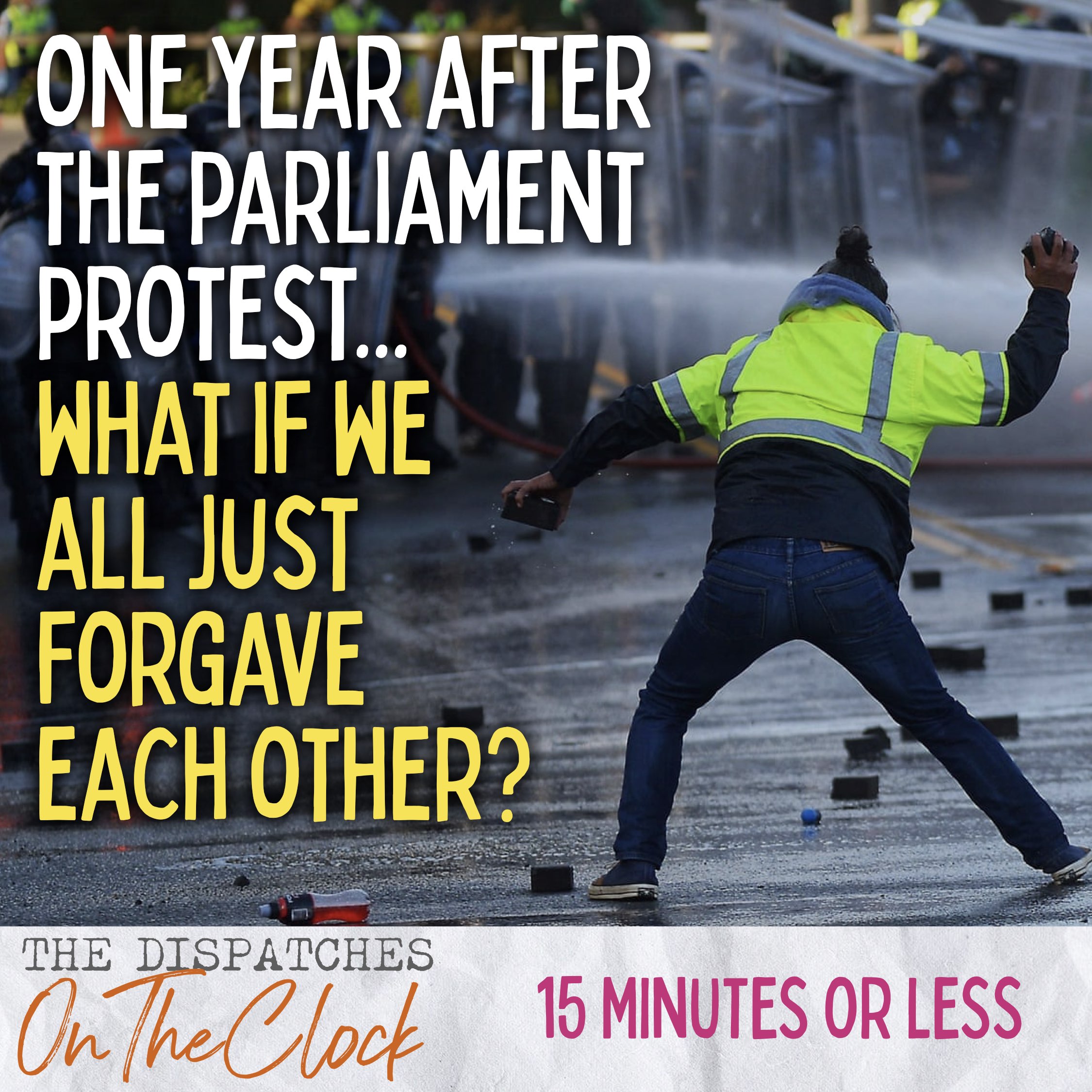[00:00:04] Hi, my name is Brendan Malone and you're listening to the dispatchers, the podcast that strives to cut through all the noise in order to challenge the popular narratives of the day with some good old fashioned contrarian thinking. You might not always agree, but at least you'll be taking a deeper look at the world around you.
[00:00:22] Hi everybody. Welcome back to the Dispatchers. My name is Brendan Malone. If you're not a patron of mine, you won't have heard the announcement earlier this week that starting from next week, Monday, the twelveth of February, the year of our Lord 2024, that the Dispatchers podcast will be moving to a daily format. One of the consistent bits of feedback that I've had from my patrons is we love the content, but a couple of really long podcasts each week are a little bit harder to consume. It's not like you can consume an hour and a half worth of content all in one go, usually on a bike ride or a workout or driving to work. It's normally not quite that long, and so people have said that it would be a lot easier to consume podcasts in shorter form. So starting from next week, that's what's going to be happening. If you're a patron, then every single day you will get an episode. A brand new episode of the Dispatchers podcast are nice, short, punchy, focused on one topic, consumable and one sitting episode of the Dispatchers. And all you have to do to get that is become a patron of left foot media with $5 or more per
[email protected]. Left footmedia if you're not a patron, then once a week you will get one of those short, punchy episodes. What? I am nicknaming the Friday Freebie on a Friday on this channel that you're listening on now. If you're new here, by the way, please don't forget to leave a review. Maybe if your podcast app allows you to give me some stars or to leave a comment or two, that'll really, really helps the show. All righty, let's jump into today's topic of conversation, a tale of two shoplifters. Shoplifter the first, the year is 2024. It is Wednesday, the 10 January. The media breaks a story which indicates that the high profile Green MP Golris Garamon is alleged to have stolen goods from a high end fashion boutique in Auckland. We all remember that incident, right? It's only a few weeks ago. The public are told that she has been stood down from her portfolios while investigations are conducted two days later. A second allegation of theft, another theft by Garamon from the same boatek, is reported. It is revealed that the shoplifting is alleged to have happened weeks earlier and that the Green party have been aware of the allegations for a while.
[00:03:00] Three days later, on January the 15th, it is revealed that Garamon is being investigated for a third act of theft from a different high end boutique, this time in Wellington.
[00:03:13] Then, on January 17, police say that Garamon has been charged with two counts of shoplifting and that investigations into the allegations were continuing. The day before that, on January 16, Garamon had publicly announced her resignation as a member of parliament for the Green Party, and in her statement, she said that a mental health evaluation found that her behavior was, quote unquote, not rational in any way due to, quote unquote, an extreme stress response relating to previously unrecognized trauma.
[00:03:57] She said, quote, I am not trying to excuse my actions, but I do want to explain them. People should rightly expect the highest standards of behavior from their elected representatives. I fell short. I'm sorry.
[00:04:12] Subsequent media reporting has revealed that she stole nearly $10,000 worth of items from those two stores. And to give important context to that, economically speaking, her annual salary during this period of theft was approximately $163,961, plus benefits per year.
[00:04:38] Now, progressives and media commentators were very quick to publicly defend her, offering all sorts of excuses, with some even claiming that racist misogyny is to blame for her departure from parliament. Yep, people have truly claimed that, while others have implied that stealing from shops isn't really that serious a thing to do. There's been plenty of equivocation, plenty of. What aboutism? Plenty of comparisons with other crimes, which doesn't really help the victims of crime, by the way. Imagine you were the victim of theft and someone said to you, well, look, it could be worse. You could have been the victim of murder.
[00:05:24] And one last thing I'll say about this first incident of shoplifting, and I think it's quite an important point. And as far as I can see, this has received very little media coverage, if any, which is kind of intriguing given the way that there seems to be a current media fervor and furor over every single little perceived wrong that the current coalition government does, right down to silly and childish allegations of copying and pasting your homework from last year on the part of Christopher Luxon relating to his speech that he gave at Waitangi this year. But I think this is an important point which, as I said, has not had any or certainly very little media coverage. And that is this. Kleptomania is a mental health disorder. That involves repeatedly being unable to resist. Urges to steal items that you generally don't need. I think that's quite an important point. But here's the other point. Often the items stolen have little value.
[00:06:38] And you could afford to buy them.
[00:06:42] But here's the really important point.
[00:06:44] Kleptomania is also very rare, according to the experts. And must be properly and carefully diagnosed.
[00:06:56] I'll leave you, the listener, to make what you will of that important truth. Especially in light of Garamon's statement. Where she said that a mental health evaluation.
[00:07:11] Had found that her behavior was not rational in any way.
[00:07:15] Which brings me to shoplifter II.
[00:07:19] The year is 1988.
[00:07:23] It is early on a Saturday morning.
[00:07:27] A young boy enters a decker store in New Zealand. For those who don't remember or don't know. Decker was a department store. It was the forerunner to Kmart. In fact, I think it was bought out by Kmart in New Zealand. And they rebranded a whole of their stores Kmart. Before there was the warehouse, there was Decker. It was like the all encompassing department store. They often had a cafe in the back. And they sold just about anything and everything.
[00:07:57] This young boy has previously been to his local library. To browse the bookshelves. Now he finds himself across the car park from the library in the decker store. Where he wanders the store.
[00:08:15] And while he does so. He picks up several cheap bags of lollies. And puts them into his pockets. And then he leaves the store without paying.
[00:08:27] As he is leaving the store. The bag checker on the main door. Gives him a funny look.
[00:08:35] Which all of a sudden makes sense. As he crosses the threshold of the store doorway. And not long after. He is tapped on the shoulder by a female store detective. Who announces to him that he has been seen shoplifting. And he needs to come back inside the store to explain himself.
[00:09:00] He is taken to the store manager's office. The police are called.
[00:09:05] He listens on with tears in his eyes and a deep sense of shame. As the manager calls his father. And asks him to come down to the store for what is about to unfold.
[00:09:17] His father does that.
[00:09:19] His father arrives. He's upset with him.
[00:09:22] And for the boy, his shame and his tears only intensify. Upon seeing this, lectures are given.
[00:09:31] A lengthy report is written. And a trespass notice is issued.
[00:09:38] Outside the store, his father tells him how disappointed he is in him for his behavior. And that he is to get on his bike. And to go straight home. Now, at home, his father tells him that his behavior is too serious for a smack and another punishment will have to be applied. Instead, his heart sinks when he hears this, because he knows that this is exactly what his grandfather told his dad after his father and his uncle burnt down a pine plantation while playing with matches.
[00:10:15] He is truly contrite for what he has done. And that shame and sense of guilt stays with him for many months. And whenever he passes that decker store, he is reminded of the incident once again.
[00:10:31] This only worsens time. He has to enter Decker, something he is now only allowed to do if a parent or guardian is present with him.
[00:10:42] Not once does he claim that stress has caused his offending.
[00:10:49] Not once does he act like he might actually be entitled to engage in these kinds of behaviors.
[00:10:57] Not once does he even so much as imagine that the extremely low socioeconomic and financial hardship of his family situation might be a justification for his behavior. Instead, he knows that what he has done is wrong.
[00:11:17] He had no right to steal those goods. His state in life as the child of a welfare class family doesn't change anything.
[00:11:28] He has sinned. He has chosen to do wrong. He has hurt his family, the people he stole from, and the wider community.
[00:11:37] He must not do it again. He must learn from his offense. He must now earn back the profoundly important bonds of trust that his actions have severed. This is what he thinks when he thinks about his shoplifting.
[00:11:56] That second shoplifter was me, and all of that is true.
[00:12:03] I grew up, and I think I might have mentioned this before, in a very poor welfare class family. We started as a working class family. My father worked for the New Zealand Railways until he was invalidated out of that job. And he was diagnosed with schizophrenia, a very serious mental illness. And as a result of the medication that he had to take for that, one of the side effects was that he had to sleep a lot. It really just knocked him off his feet. And so he was never able to work another full time day in his life. He did voluntary jobs wherever he could, including things like driving the van for a local christian school to get students to and from school several days a week. But that was the extent of what he was able to do. So we were a very poor welfare class family. There were times when we didn't know where our next meal was coming from. And if it wasn't for the kindness of christian strangers, then we wouldn't have eaten. We had one bike, the very first bike we had in our house. And us three older brothers, we had to share that one bike. And that one bike was not brand new. It was a secondhand bike that came from one of my uncles. I'm very grateful for that bike.
[00:13:19] But that was our situation.
[00:13:21] We never went on family holidays apart from once. And we went on that family holiday because the St. Vincent de Paul society funded that family holiday. They allowed us to use a home that they own in Picton. And so we got in the car and drove up there. It was a very, very basic family holiday. Lot of great memories about that moment. And by the way, I wouldn't change my family upbringing for the world. I mean, it would have been nice to have had a bit more money in the family bank account, that's for sure. But our life wasn't a life of sorrow. It wasn't a life of darkness and bleakness.
[00:13:59] It was a life full of many good and happy memories. But we were a very poor family.
[00:14:06] And I imagine, given other circumstances, it could have been very tempting for me to think that somehow I was entitled to steal from that shop, to maybe blame the corporations, to blame the state, to blame the system for the situation I found myself in.
[00:14:26] In fact, I never did that. It never even crossed my mind to do that or to make justifications or excuses for what I'd done as a result of that incident. My parents were so freaked out about what was going on. They're like, oh, my gosh, our son's becoming a criminal. Because my parents, my late father and my still living mother, they are good people, and they were worried about their son. And so that prompted them to go and speak to the leader, the youth pastor at the local youth group, our catholic church that we were going to, our catholic parish didn't have a functioning youth group at the time. But literally two doors down from us, and I mean literally, there was us, then one house, and then next to that was a local evangelical church that had been a former brethren church, then had become affiliated with the new life and now was just, I guess you'd say, a community evangelical church. And they had a really good, well functioning youth group. Great youth pastor looking after it. I'm still friends with him, by the way. And my parents went and approached him and said, look, we know that he's not yet of age to be able to attend, but would you make an exception? Because here's what's happened. And we worried about him. And so they did. And I am eternally grateful to my parents for doing that.
[00:15:47] Here's the thing. Unlike our first shoplifter, my parents never, ever taught me to offer excuses, and they never taught me to psychologize my sins.
[00:15:59] They taught me to own them. They taught me to be contrite. They taught me to seek forgiveness from God and from those I had wronged, and to do penance and to make amends.
[00:16:10] Why did they impart this great gift of truth about the moral life and about human flourishing? To me, which, by the way, was a profound act of love on their part, discipline might not feel like love, and I don't know if they necessarily felt particularly loving at the time they were having to discipline their son. But it was a great gift that they imparted to me. So why did they impart this great gift of truth about the moral life and about human flourishing to me, what it takes to flourish as a human being? Well, because they themselves were faithful adherents to the sacred, transcendent religious tradition of Christianity.
[00:16:48] That was the thing that made the difference.
[00:16:51] And Christianity excels in its understanding of the human condition, and it has some very important doctrines that flow out of this.
[00:17:02] Christianity understands what it means to be human, what it means to be a human person. Born into a state of sin and with a pochant for sin.
[00:17:18] We have a weakened will and a darkened intellect.
[00:17:23] We struggle to know what is good despite our graspings. And even when we know what is good, our will is weakened. We struggle to do what is good. That's why human utopia will never be possible this side of heaven, because we are flawed, fallible human beings. And flawed, fallible human beings should never, ever fool themselves into thinking that they can build heaven on earth.
[00:17:53] So the church understands what it is to be human, and even more importantly, what is essential for human flourishing, because the church has received a profoundly beautiful and wondrous divine revelation from God. That's certainly the christian belief about what is essential for salvation, what is essential for a good and flourishing moral life, what it means to be a human person, how human fullness and completion is truly found.
[00:18:24] And then, on top of all of that, 2000 years of prayerful contemplation will definitely produce some very deep wisdom about all of these important realities. That's what the church offers, the christian church.
[00:18:38] And when I was thinking about the theft perpetrated by Golras, for some reason, I was reminded of an article I read recently about an Aussie supermarket that has decided to abandon automated checkouts. So they got the old automated checkouts where you turn up, you scan your groceries, the machine talks to you very loudly and tells you what to do next. You don't engage with a human person. And then you pay your bill and you leave. But it turns out that a lot of people are not paying their bills or they are stealing items. They are sneaking these things into their baskets, their trolleys. They're not paying for them.
[00:19:17] Why? Because it turns out that flawed, infallible human beings will behave as flawed, infallible human beings if you treat them in such a way that is. Well, it's utopian. It's also kind of dystopian, the automated checkout. A lot could be said about automated checkouts. The sense that you don't engage with a real human person questions around robbing people of the dignity of meaningful work. And also the fact that there's this belief that people will just turn up to an automated checkout without much in the way of supervision, and they will conduct themselves the majority of the time as virtuous people.
[00:19:59] It turns out that that idea is a little bit utopian. So they've had to abandon these automated checkouts. It was just costing them too much. So they've gone back to the old school way of doing it. It turns out it's quite a good idea.
[00:20:15] Jean Jacques Rousseau, the enlightenment liberal, proposed the idea of a natural state of goodness in the heart of humanity. Jean Jacques Rousseau's idea was that we were born with a state of virtue, a state of natural goodness, a state of nature that was such that we were actually capable of properly discerning what is virtuous and what is not, and that it is only layers of christian society that actually corrupt that instinct.
[00:20:47] And therefore, and I think I might have mentioned this previously, according to Rousseau, when you consider his philosophy in its full context, the older you are, the longer you've been living in that society, the more corrupted you are by it, and the less capable of discerning what is good and virtuous you are. And therefore, the younger you are, the closer to the state of nature you are. Thus the valorization of youth is born the notion that young people are just automatically more virtuous than those awful older people. Insert your generational allegation here. The boomers have ruined everything, right?
[00:21:27] But basically, Jean Jacques Rousseau's enlightenment liberal idea of a natural state of goodness in the heart of humanity is false. The christian vision of reality is true, not his. And the advent of automated checkouts proves this in a very, very stark way. Christianity, on the other hand, recognizes the true state of the human condition. As I've said, our fallen nature and our need of God, our need to constantly be vigilant, to be on guard, as St. Paul says, because the devil roams about like a roaring lion looking for people to devour, which in turn points us to the great need we all have of God's mercy and love. And that when God gives us moral laws, they are not burdens, but they too are also an extension of his mercy. And we live in a culture that doesn't really grasp this, a culture of radical, autonomous, self choosing individualism, which sees any imposition upon me which I don't choose for myself as being some great evil, when in actual fact the moral laws that God gives us, they're not burdens, they're not impositions, they too are also an extension of his mercy. Because when we conform ourselves to them, individuals and societies find authentic human freedom and flourishing. They actually are a path to authentic freedom and to authentic flourishing.
[00:22:52] And so for me, the criminal offending of Golrus Garamon, in particular the attempts that have been made to downplay or to offer justifications, is a really stark reminder that we all struggle with this temptation to make excuses for our errant behaviors. I'm not making this podcast to ridicule Garamon or to try and claim, well, I'm better than she is, because the truth is, I'm actually not.
[00:23:21] But it is a powerful reminder once again that we all struggle. Now, shoplifting might not be our temptation, but we all struggle with things, with sins, and we all struggle with this temptation to make excuses for our bad behaviors.
[00:23:36] I mean, how often do we hear or even say ourselves, well, it's just a quirk of my personality.
[00:23:43] It's just the way I am often in relationships. That's the thing. You just got to understand. It's just the way I am. It's a very convenient excuse. I have to stop myself whenever I either use it or I'm tempted to use it and remind myself, no, that's Brendan, come on, man.
[00:24:00] But here's the thing. True healing and human flourishing is not found in doing this. It's not found in psychologizing our sins. It's not found in making justifications or excuses. It's not found in blaming others. It's not found in equivocation. It's not found in saying, well, the corporations do bad things. So it's actually okay if I do some smaller bad things of my own to the corporations, that kind of thing. It's not found in that marxist victim, oppressor, oppressed mentality and approach to life, that true healing and human flourishing is only found when we face our sins with honesty. When we are truly contrite, when we seek forgiveness and we begin that process of making amends. That's where true healing and human flourishing is found. Thank you so much for tuning in. Don't forget, live by goodness, truth and beauty, not by lies. And I will see you next time on the dispatchers.
[00:25:08] The Dispatchers podcast is a production of left foot media. If you enjoyed this show, then please help us to ensure that more of this great content keeps getting made by becoming a patron of our
[email protected].
[00:25:21] Left foot media link in the show notes thanks for listening, one see you next time on the dispatches.






